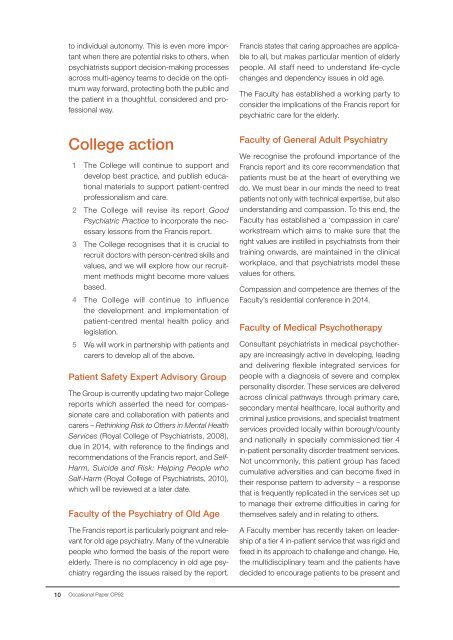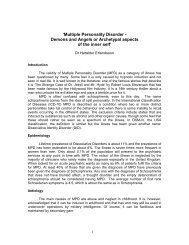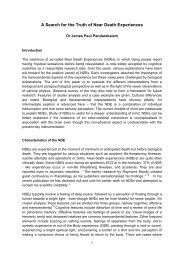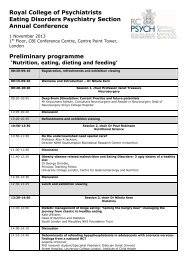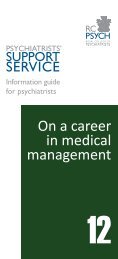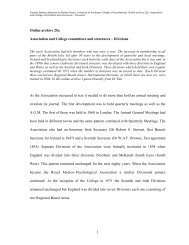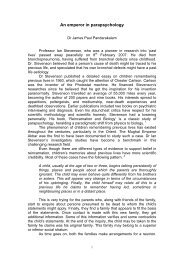Driving quality implementation in the context of the Francis report
Driving quality implementation in the context of the Francis report
Driving quality implementation in the context of the Francis report
Create successful ePaper yourself
Turn your PDF publications into a flip-book with our unique Google optimized e-Paper software.
to <strong>in</strong>dividual autonomy. This is even more important<br />
when <strong>the</strong>re are potential risks to o<strong>the</strong>rs, when<br />
psychiatrists support decision-mak<strong>in</strong>g processes<br />
across multi-agency teams to decide on <strong>the</strong> optimum<br />
way forward, protect<strong>in</strong>g both <strong>the</strong> public and<br />
<strong>the</strong> patient <strong>in</strong> a thoughtful, considered and pr<strong>of</strong>essional<br />
way.<br />
College action<br />
1 The College will cont<strong>in</strong>ue to support and<br />
develop best practice, and publish educational<br />
materials to support patient-centred<br />
pr<strong>of</strong>essionalism and care.<br />
2 The College will revise its <strong>report</strong> Good<br />
Psychiatric Practice to <strong>in</strong>corporate <strong>the</strong> necessary<br />
lessons from <strong>the</strong> <strong>Francis</strong> <strong>report</strong>.<br />
3 The College recognises that it is crucial to<br />
recruit doctors with person-centred skills and<br />
values, and we will explore how our recruitment<br />
methods might become more values<br />
based.<br />
4 The College will cont<strong>in</strong>ue to <strong>in</strong>fluence<br />
<strong>the</strong> development and <strong>implementation</strong> <strong>of</strong><br />
patient-centred mental health policy and<br />
legislation.<br />
5 We will work <strong>in</strong> partnership with patients and<br />
carers to develop all <strong>of</strong> <strong>the</strong> above.<br />
Patient Safety Expert Advisory Group<br />
The Group is currently updat<strong>in</strong>g two major College<br />
<strong>report</strong>s which asserted <strong>the</strong> need for compassionate<br />
care and collaboration with patients and<br />
carers – Reth<strong>in</strong>k<strong>in</strong>g Risk to O<strong>the</strong>rs <strong>in</strong> Mental Health<br />
Services (Royal College <strong>of</strong> Psychiatrists, 2008),<br />
due <strong>in</strong> 2014, with reference to <strong>the</strong> f<strong>in</strong>d<strong>in</strong>gs and<br />
recommendations <strong>of</strong> <strong>the</strong> <strong>Francis</strong> <strong>report</strong>, and Self-<br />
Harm, Suicide and Risk: Help<strong>in</strong>g People who<br />
Self-Harm (Royal College <strong>of</strong> Psychiatrists, 2010),<br />
which will be reviewed at a later date.<br />
Faculty <strong>of</strong> <strong>the</strong> Psychiatry <strong>of</strong> Old Age<br />
The <strong>Francis</strong> <strong>report</strong> is particularly poignant and relevant<br />
for old age psychiatry. Many <strong>of</strong> <strong>the</strong> vulnerable<br />
people who formed <strong>the</strong> basis <strong>of</strong> <strong>the</strong> <strong>report</strong> were<br />
elderly. There is no complacency <strong>in</strong> old age psychiatry<br />
regard<strong>in</strong>g <strong>the</strong> issues raised by <strong>the</strong> <strong>report</strong>.<br />
<strong>Francis</strong> states that car<strong>in</strong>g approaches are applicable<br />
to all, but makes particular mention <strong>of</strong> elderly<br />
people. All staff need to understand life-cycle<br />
changes and dependency issues <strong>in</strong> old age.<br />
The Faculty has established a work<strong>in</strong>g party to<br />
consider <strong>the</strong> implications <strong>of</strong> <strong>the</strong> <strong>Francis</strong> <strong>report</strong> for<br />
psychiatric care for <strong>the</strong> elderly.<br />
Faculty <strong>of</strong> General Adult Psychiatry<br />
We recognise <strong>the</strong> pr<strong>of</strong>ound importance <strong>of</strong> <strong>the</strong><br />
<strong>Francis</strong> <strong>report</strong> and its core recommendation that<br />
patients must be at <strong>the</strong> heart <strong>of</strong> everyth<strong>in</strong>g we<br />
do. We must bear <strong>in</strong> our m<strong>in</strong>ds <strong>the</strong> need to treat<br />
patients not only with technical expertise, but also<br />
understand<strong>in</strong>g and compassion. To this end, <strong>the</strong><br />
Faculty has established a ‘compassion <strong>in</strong> care’<br />
workstream which aims to make sure that <strong>the</strong><br />
right values are <strong>in</strong>stilled <strong>in</strong> psychiatrists from <strong>the</strong>ir<br />
tra<strong>in</strong><strong>in</strong>g onwards, are ma<strong>in</strong>ta<strong>in</strong>ed <strong>in</strong> <strong>the</strong> cl<strong>in</strong>ical<br />
workplace, and that psychiatrists model <strong>the</strong>se<br />
values for o<strong>the</strong>rs.<br />
Compassion and competence are <strong>the</strong>mes <strong>of</strong> <strong>the</strong><br />
Faculty’s residential conference <strong>in</strong> 2014.<br />
Faculty <strong>of</strong> Medical Psycho<strong>the</strong>rapy<br />
Consultant psychiatrists <strong>in</strong> medical psycho<strong>the</strong>rapy<br />
are <strong>in</strong>creas<strong>in</strong>gly active <strong>in</strong> develop<strong>in</strong>g, lead<strong>in</strong>g<br />
and deliver<strong>in</strong>g flexible <strong>in</strong>tegrated services for<br />
people with a diagnosis <strong>of</strong> severe and complex<br />
personality disorder. These services are delivered<br />
across cl<strong>in</strong>ical pathways through primary care,<br />
secondary mental healthcare, local authority and<br />
crim<strong>in</strong>al justice provisions, and specialist treatment<br />
services provided locally with<strong>in</strong> borough/county<br />
and nationally <strong>in</strong> specially commissioned tier 4<br />
<strong>in</strong>-patient personality disorder treatment services.<br />
Not uncommonly, this patient group has faced<br />
cumulative adversities and can become fixed <strong>in</strong><br />
<strong>the</strong>ir response pattern to adversity – a response<br />
that is frequently replicated <strong>in</strong> <strong>the</strong> services set up<br />
to manage <strong>the</strong>ir extreme difficulties <strong>in</strong> car<strong>in</strong>g for<br />
<strong>the</strong>mselves safely and <strong>in</strong> relat<strong>in</strong>g to o<strong>the</strong>rs.<br />
A Faculty member has recently taken on leadership<br />
<strong>of</strong> a tier 4 <strong>in</strong>-patient service that was rigid and<br />
fixed <strong>in</strong> its approach to challenge and change. He,<br />
<strong>the</strong> multidiscipl<strong>in</strong>ary team and <strong>the</strong> patients have<br />
decided to encourage patients to be present and<br />
10<br />
Occasional Paper OP92


